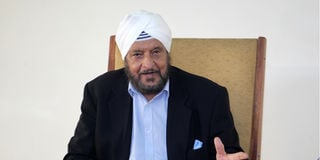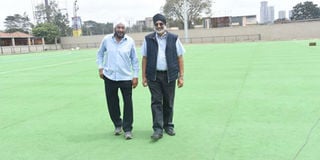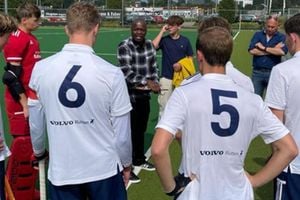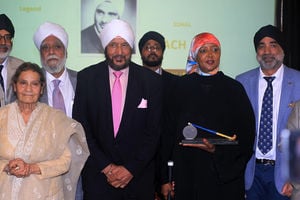
Vaisakhi Hockey Tournament Director Avtar Sohal Singh speaks at Sikh Union ground in Nairobi on on April 14, 2023.
Two energetic young men of Asian origin, Avtar Singh Sohal and Amar Singh Mangat, lifted and carried Kipkurgut Chuma, the lone Kenyan bronze medallist from the 1964 Olympic Games in Tokyo, shoulder-high from the aeroplane to the ground at Nairobi Airport (now Jomo Kenyatta International Airport) before handing him over to a group of officials and a horde of excited fans.
The jubilations continued to the centre of Nairobi.
Avtar Singh Sohal, or simply Avtar, and Tari, to those close to him, was playing his role as the overall team manager after showing leadership skills in the previous Games, the 1960 Rome Olympics, while part of the national hockey team when Kenya competed as a British colony.
Hundreds of government officials and fans cheered and danced madly as they joined the procession back to the city centre through Outer Ring Road and Jogoo Road where more Kenyans lined up to greet the team.
Avtar and Mangat were members of the Kenya hockey team that finished an impressive sixth in Tokyo.
Giants of the game then India won gold, Pakistan silver and Australia bronze. Spain were fourth and West Germany fifth.
Avtar is now 86. He has received many recognitions, the medals housed at the Simba Union Club in Nairobi a museum featuring him has been established, with a comprehensive collection of hockey material.
It is in fact dedicated to Avtar and is filled with well-kept newspaper cuttings, books, his playing kit, ceremonial blazers, medals and awards.
It was opened two years ago by the then Sports Cabinet Secretary Amina Mohammed in the presence of diplomats from Pakistani and Indian high commissions.

Kenya’s Olympian Avtar Singh Sohal admires pictures of legendary hockey players, including those featuring him, that will be on display during an exhibition from September 19, 2016 at Sikh Union Club, Nairobi. PHOTO | ROY GACHUHI |
One item stands out -- an edition of the Guinness Book of World Records where his name is immortalised as the world’s most capped player with 167 international games between 1957-1985, a period of remarkable success of hockey in Kenya.
The game flourished in many secondary schools where a hockey sticks was as mandatory as the mathematical geometric set when students were being admitted.
The other Kenyan to appear in the Guinness Book of records sports section is Shekhar Mehta, who won the WRC Safari Rally a record five times.
Hockey has been the preoccupation of Avtar for 67 years since he first earned his Kenyan cap in 1957 aged 19 and competed at the Olympics in 1960.
He represent Kenya in four other editions as a player and coach, competitively appearing in his last Olympics in 1984 Los Angeles.
Note that Kenya sadly boycotted the 1972 and 1976 Olympic Games because of geopolitical reasons.
Avtar continued to attend the Games as a judge and umpire appointed by the International Hockey Federation (IHF).
He attended the delayed 2020 Tokyo Olympic Games in 2023 at the invitation of the Federation of International Hickey (FIH) and honoured for his continued commitment to the sport.
Avtar is well known for coaching Kenya. But so knowledgeable was he of the game that other countries tapped him out as a coach, namely, Hong Kong, Indonesia and Zimbabwe.

Kenyan hockey legend Avtar Singh Sohal (left) and Manminder Singh Jandu inspecting the newly constructed modern stadium at Sikh Union Club in Nairobi on July 19, 2019. PHOTO | EVANS HABIL | NATION MEDIA GROUP
He also coached Kenya Breweries,
His contribution in sports and work with young people has not gone unnoticed.
President Uhuru Kenyatta awarded him the Order of the Grand Warrior (OGW) during the 2022 Jamhuri Day celebrations which marked his 64 years of being in the sports.
This was an addition to another Head of State Commendation (HSC) conferred to him by President Mwai Kibaki had in 2005 , making him one of the few multiple recipients of state commendations.
Avtar left a lasting impression on hockey players he interacted with at Simba Union Club, Kenya Breweries and the national team.
He started playing for Simba Union in 1955 aged 17 and left the team in 1972 aged 34.
“I knew no other life in my entire youth,” recalls Avtar, who is on a world tour in Asia, in a video interview.
“You know I am a mzee now and I like visiting different countries. I have been to India and Pakistan where I have been visiting gurdwara (a Sikh place of worship) temples for prayers and visiting friends. I will return to Kenya in November.
“There is no other country like Kenya.”
”I am a deeply religious man. I have visited Patna Saheb, Reetha Saheb, Hazur Saheb and other gurdwaras. I have also visited my ancestral village Virk in Phagwara accompanied by my wife Ripudaman Kaur in India. When I am in my village or Reetha Saheb, I get a sense of being on the lap of Guru Nanak Devji. My wife, who is from Patiala, and I spend a lot of time visiting gurdwaras,” he says.
Avtar started playing hockey at the ago of 10 years. His talent was quickly noticed when he joined the Duke of Gloucester (now Jamhuri High School).
He played for Nairobi in their match against British Kenya at 19, and never looked back.
“Playing against British Kenya was not normal. It was an honour,” he recalls.
Before long, Avtar would find himself making his Kenya debut in 1957 against South Africa. Within two years he had became a permanent member of the team.
In 1948, his father took him to watch India play Kenya at Parklands Sports Club, Nairobi and he came into contact with their star player Major Dhyan Chand who became his ultimate hero.
“I still remember the time when the Indian team came to Kenya in 1948 under the captainship of the great Dhyan Chand.
“After watching Chand in a match, something changed in him. His dribbling and dodging were just something else. It was, thanks to him, that I developed a madness for the game. When he would play it was as if the ball was perpetually stuck to the stick. It was sheer magic! I can very confidently say that Major Dhyan Chand changed my life. “
But his father, Piara Singh Sohan , like parents of his generation, never showed any emotional attachment to a child but believed in criticising to bring the best out of them.
“My father was my fiercest critic,” he recalls.
But he found a lot of encouragement from his wife of 60 years.
“I have to mention the role my wife has played in my career. Here she had a husband who would time and again walk out of the house with his hockey stick slung over one shoulder when he would be playing other parental roles.”
Avtar’s finest hour came in the 1971 Hockey World Cup in Barcelona where he captained Kenya to a fourth position after losing 2-1 to India in the semi- final.
This is the highest position Kenya, has ever achieved in a global competition, in and era where they were a superpower in the same league with Indian and Pakistan then.
“I was at my best in that semi-final against India. I had scored one goal at half time and we were at the threshold of knocking out India to claim the bronze medal in the first hockey World Cup. But that was not meant to be as India scored two goals in the final moments,” he recalls.
Avtar says that hockey with the right investment and support can achieve great results and Kenya can once again become a force to reckon with in the world.
He feels sad that Kenya last competed in the Olympic Games 32 years ago.
What should a young player aspire to achieve in sports?
“Discipline. Love for the game. Honesty. Hard work. Diet,” he simply says.
“Not only just a youngster but also every sports person. And never lose your cool on the field. That is so important. One needs to stay focused, and I can proudly say that not once have I lost control of my emotions on the field.”
His parting shot: “Respect for one’s parents, coach, seniors and teammates is extremely crucial. It helps develop one’s personality and character. And most importantly, prayers, and the blessings of Waheguru! You will never fail.”





